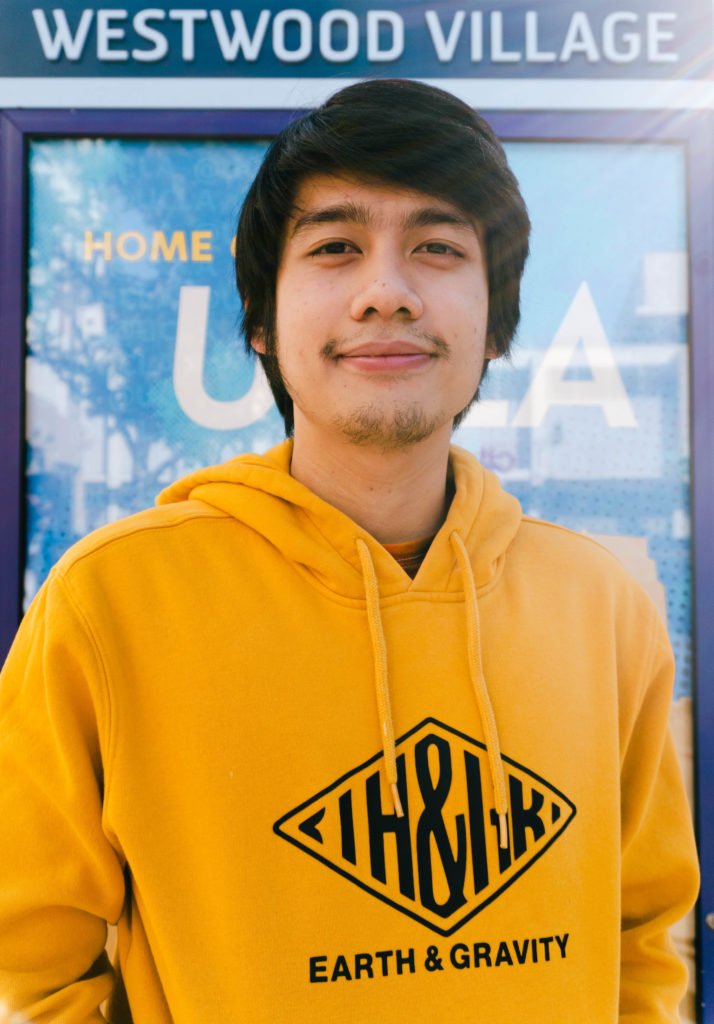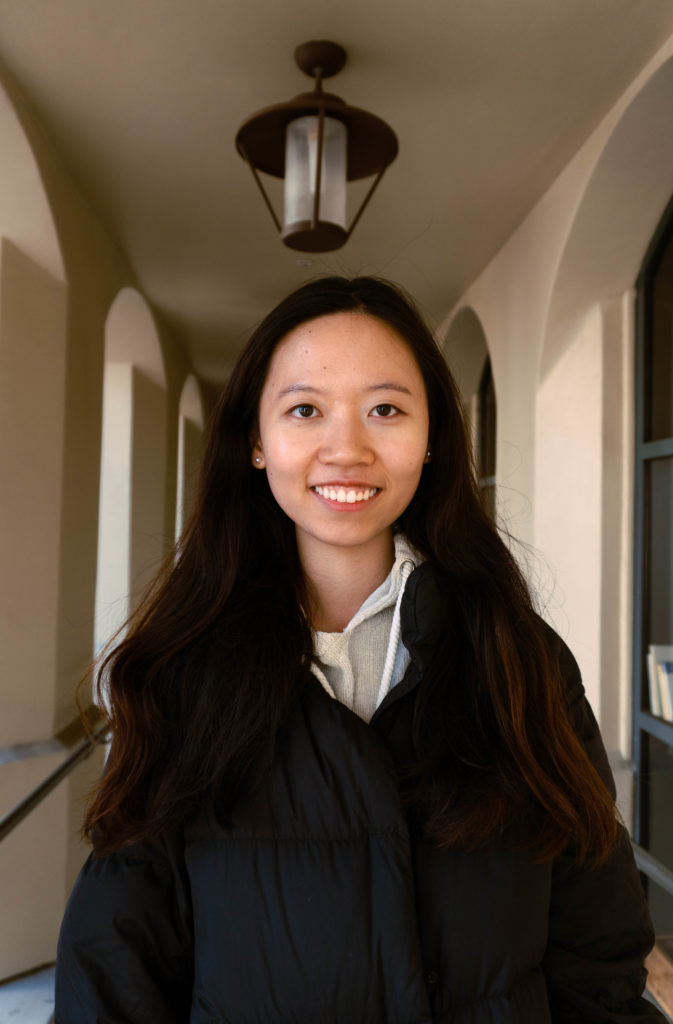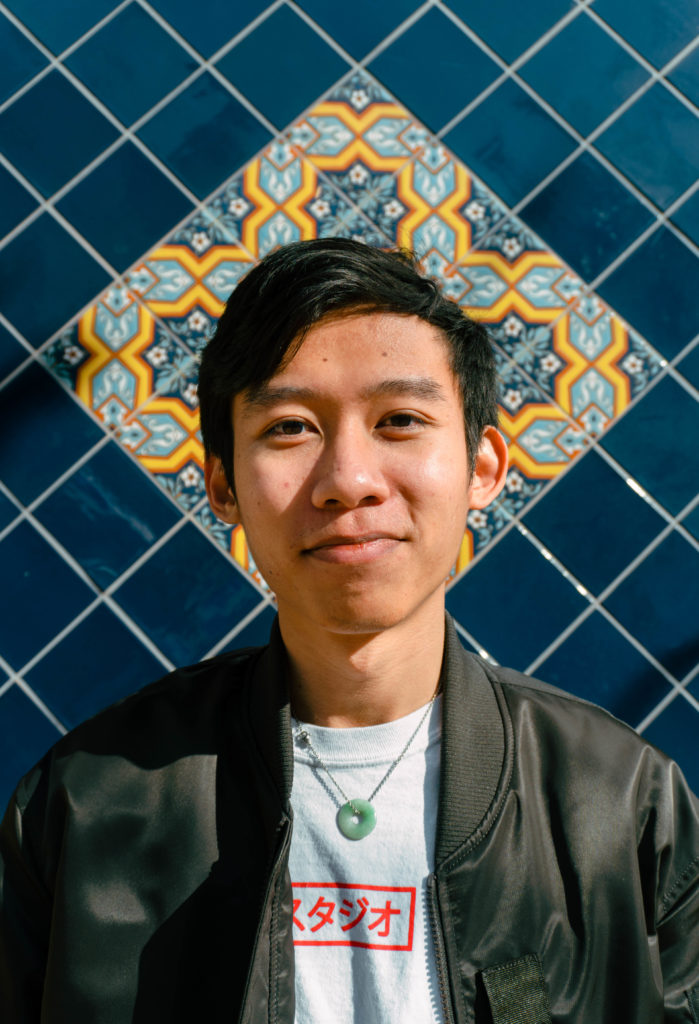by Tsen Ee Lin
Out of the 46,000 students in UCLA, only around 40+ understand the joy of ‘Balik Kampung’ and speak in surs of lahs and midnight mamak stalls.
Emir, Ivan, Celine and Jeffrey are all a part of the Malaysian Students Association of UCLA, and together, they’ve built a sense of keluarga whilst navigating the trials and tribulations of studying abroad. From studying blackholes to vaccine misinformation, each of their majors dives into various fields and come with their own set of reflections and experiences.
I’ve been lucky enough to have a conversation with these bright individuals and learn the biggest takeaways they’ve discovered; what studying in Malaysia was like, and how they plan on taking on the world post-graduation and bring about groundbreaking discoveries to their fields.
Emir Izat Bin Abdul Rashid, 23
Shah Alam
Senior in Applied Math
Ultimate makan: the all-classic Nasi Lemak

“I studied at SMK Seksyen 9, then I went to KY [Kolej Yayasan UEM] for my A-Levels and now I’m at UCLA. My fond memories back home revolved around having a group of core friends who understand your culture. Here, you have to explain why you do things the way you do, and it can get tiring after a while.
“I liked studying in Malaysia. It was great, but I feel like the contrast with studies is that they’re very geared and there’s a certain steering in the direction you take; there aren’t a lot of choices and that’s why American education differs from Malaysia. Back home, once you pick a major you have to stick with it until the end and you don’t have a lot of choices to branch out.
“Another major difference between Malaysia’s style of education compared to America’s is that it’s more hands-on and you get a bigger view of the world; you get to see why you research, what you study and where it’s positioned, located, situated within a greater scheme of knowledge.”
On Changing Majors
“I was a Physics major for the first two years, then in my third year, I changed to Applied Maths. I got really interested in misinformation and the study of fake news and political polarization. I studied misinformation by using mathematical principles and studied the diffusion of misinformation. The math in political science is actually similar to the ones we use in physics, involving lots of probability and statistics. So I decided to switch my major. It was an easy switch because I ticked most of the requirements.”
The Scoop on Vaccine Misinformation – Emir’s final thesis surrounds vaccine misinformation in Malaysia. Here’s the scoop.
“I found that misinformation in Malaysia is very low, and the way our government responds to it is very good. Vaccines in Malaysia have been generally pretty okay lah, which the same can’t be said in America and other developed countries, so my concern is more on how we’re changing as a society as compared to how we identify societal issues. There are still many things we don’t understand about ourselves as Malaysians, how that consensus is made, and how people are trying to decide for themselves is being hijacked by money and power. We really need to find those sources of instability and critique them.”
Taking It Easy
“I’d say the biggest lesson I learned is to take it easy and that you’ll get there. You make a lot of mistakes, like social cues are something that’s specific to certain cultures and as you get more ingrained in the society you’ll get better about it. You shouldn’t stress so much about fitting in; take it easy and you’ll have good faith in what you’ve set out to do.”
Post-Grad
“I wanna do a political science masters and I want to get a PhD and work in academia. I wanna learn about societies and I find it very fascinating how bureaucracies and people organize themselves and produce many wonderful things like science. I’m really interested in that.”
Ivan Teng Cheng Fatt, 24
Kuala Lumpur
Junior majoring in Business Economics, minoring in Accounting
Ultimate makan: a warm bowl of Bak Kuh Teh

“Studying in Malaysia was kinda interesting for me because I went to a Chinese primary school then a public school, so the medium of instruction was Chinese then to BM. Then, I got a scholarship to study in Taylor’s College where the medium of instruction was English.”
“For me, I was constantly trying to learn new things and adapt at every stage of education I was in. There was never a time when I was comfortable and went with the flow because I was always in a whole new environment. It was the same as well coming to the US, and although I had two years of English education at Taylor’s, the US culture is different. People here are different, and the education style is American as opposed to British, which I was studying for the past 15 years of my life.”
Jack of All Trades – What was the shift like between BM, Chinese and English?
“For me, the shift was rather okay. I also studied BM and English in my Chinese primary school, so when it came to comprehension and writing it wasn’t a problem, but socially it was difficult to blend in.
“As a Chinese student, you’re mostly surrounded by other Chinese in primary school, but when you go to SMK, most of your friends are Malay or English-educated Chinese. I just clucked around for the first two years and most of my friends were from Chinese primary schools, so I didn’t really speak a lot of English or BM, but when I went to Form 4 we were split into different stream classes (arts or science) and most of my friends were in different classes.
“My new friends spoke English a lot more and it was difficult. At that point, I was branded as a shy and quiet person when in nature, I wasn’t—I just didn’t know how to express myself, so I chose to remain quiet. That was my experience and it wasn’t particularly hard, but it helped me enhance my adaptability skills, so if you put me in a different place right now I’d adapt pretty well, so it’s definitely a plus.”
Sunny California – Not a fan of the UK’s chilly weather, Ivan set his sights on the States after completing his IB exams (International Baccalaureate).
“I took my chances and decided to only apply to US universities, so I kinda put all my eggs in one basket, but it worked out okay as I got an offer from UCLA. Right now, I’m a junior, and in the next five years I hope to graduate and get a job in the US. Finance is a big industry and I don’t have a specific area of specialization, but I’m currently very interested in investing and making financial decisions. Finance is a tool to make businesses work, and to me, businesses are really interesting. If I go into a Starbucks, the first things I would be thinking of are what is their business model, how do they make money and how do they appeal to their customers? These things are very dynamic and can be daunting as it ultimately comes at the sheer cost of money, but it keeps my adrenaline going, and as an undergrad I want to know more about the world.”
Setting Goals and Trusting The Process
“The biggest lesson I learned here is about myself and the meaning of education. Back home, education was a means to an end— a good grade, a good job. It’s rather short term, but coming here I realized that it doesn’t work that way, because if you keep thinking in the short term, it will be increasingly difficult at every stage you go up; and without a long term goal, it’s not sustainable. It was very frustrating at the start because you want an answer immediately, but you’ll realize that it’s a process, and knowing what you want, who you are, takes years. As much as I don’t like uncertainty, certainty bores me.
“I also learned how to make things happen. Back in Malaysia, you just go with the flow—the conventional way of doing things—and you’re more inclined to follow other people’s paths as you have a preconceived notion on how things should be, but I learned that you have to create your own opportunities.”
Celine Hoh Zhou Min, 23
Johor Bahru
Senior majoring in Computational and Systems Biology
Ultimate makan: a steaming bowl of Assam Laksa

“I went to a nearby Chinese primary school, a nearby SMK for my Form 1, and after that, a Chinese independent school in Sibu, Sarawak. After taking the Chinese independent’s school equivalent of the PMR, I got into PERMATApintar and studied there for my Form 4 and Form 5.”
SMK versus SMJK
“I feel like the Malay system focused a lot more on Malaysian history and geography while the Chinese system focused more on Math and world history in general. In Malay schools, I would say, the teachers are a lot more hands-on and they let us do what we want to do, while in Chinese schools my teachers have been more dedicated, and there’s a lot more memorizing.”
After finishing her A-Levels at KYUEM, Celine’s life turned one-eighty as she got on a plane and bid farewell to her friends and family.
“I never actually imagined that I would come to the US to study because it’s so expensive, but very luckily, when I was 17, and still in PERMATApintar, I got a Yayasan scholarship and they funded my studies here.
“When people take A-Levels, they normally go to the UK, but I’ve always been very fascinated about the whole US education system. First, I am very interested in biotech, and there are more research opportunities and biotech companies here. I’ll also say that the UK school system is more rigid because if you choose one major, you’ll have to stick with it, whereas here you can even change your mind in your third year. They also make you take all these general education classes, which are really interesting.”
GED Classes – What’s the most interesting class you’ve taken?
“Well, I can talk about a class I am taking right now and it’s called Horror Movies in South East Cinema. There’s a Japanese, South Korean, and even a Hong Kong unit. I would recommend everything I’ve watched, but if you’re looking for something scary, definitely check out “Ringu” which is the original Japanese version of ‘The Ring’.
“Based on my own experiences, the teachers here encourage us to voice out more, and there are definitely a lot more group projects; whereas in Malaysia, it was more about how much you can memorize, doing past years, and figuring out the pattern to it. I’ve learned to not be afraid to voice out my opinions. When I first came here there was the whole accent thing, and I was worried if they couldn’t understand me or if what I was saying was stupid, but my takeaway was to just ignore all of it; be brave and say what’s on your mind.”
With the exciting news of being accepted into the John Hopkins PhD program, Celine will spend the next five years completing her PhD in computer science, and hopes to one day become a leading researcher in her field.
Kai Bo Lee (Jeffrey), 21
Kedah
Junior majoring in Physics, minoring in Math
Ultimate makan: the all-classic Nasi Lemak

“I went to an SJK(C) and a public school for my secondary, then INTI Penang for my A-Levels. It was tough coming from a public school in Kedah and applying to the US as my teachers didn’t really know how to apply, and I had to teach them how to make an account and translate everything. I even had to write the school report that they gave me in Malay and translate and compile everything, then send it to the US colleges. So that was definitely a couple steps, but my school was really supportive and readily gave me all the documents.”
Living out his 15-year-old dream
“I was 17 when I applied, but I had already decided to study here since I was 15. At that point, I wanted to study physics, and I realized that physics in Malaysia is really underdeveloped, so I couldn’t really get a lot of opportunities to work on physics back home. I even tried getting research opportunities when I was in high school, but it was just not interesting. I knew that if I wanted to study physics, I had to go somewhere else that has more developed physics programs, so I settled on the United States.”
From Aerospace to Blackholes and Relativity
“Originally, I wanted to study aerospace engineering. I’m really interested in planes and I love planes, but at some point, I found this side of YouTube that led me to a bunch of science channels. I discovered a lot of things about physics that were really cool, and I started to fall down rabbit holes about blackholes and relativity.
“With physics, you’re really pushing against the cutting-edge of human knowledge, and I feel like there’s a chance I can contribute to finding out more of the world. I really like that idea of discovery, so I decided to study physics to satiate my curiosity.
Reminiscing on High School
“In high school, me and my friends traveled a lot, especially on the KTM (Keretapi Tanah Melayu). And at one point, because we joined a lot of competitions, I was traveling every two weeks and always had a bag ready to go. Sometimes the competitions would be in the middle of nowhere, and I remember this one time when we were in rural Kedah and there was only one school in the area. We stayed at the dorm, but we snuck out and found a lone mamak stall at the side of the road and just hung out there till 2 AM drinking teh tarik and eating roti canai. It was so much fun.
“There are no mamak stalls in the US, so that’s a shame, but I still met a lot of friends and connections that I didn’t know I could make. I never went to a university in Malaysia and I don’t know if this culture is present, but just talking to my friends here at UCLA, they always have this grand idea of making a drastic change and it’s very inspiring.
“Back home, it’s more like ‘I need to get that high-paying job’ and ‘I need to study more’, memorize this for this exam, boost my GPA. Not to say that it’s wrong, but I just find that it’s a different culture there. It’s not their fault and they have different priorities. Most of the friends I know are from the middle or lower-class level and maybe they’re just trying to get out of that cycle of poverty. Most of the people I’ve met here in the US are very privileged as their parents are all professors or have high degrees, so maybe that’s what enables them to pursue something other than monetary returns. I feel like that’s the difference between the viewpoints of Malaysia and here.”
Opportunities Are Everywhere—you just have to look
“Opportunity doesn’t come to you—you have to look for them yourself. Almost all of the best opportunities that I’ve received have been when I decided to send that email. One time out of ten, an email comes back and you immediately think back to when you first sent that email: nobody’s gonna reply, but sometimes that one reply opens doors, and I think it’s really important to put yourself out there.
“I was not expecting to get a summer internship in my freshman year, but I decided to apply anyway. I actually went to the website, to the first listing I could find and emailed them. It was a research opportunity at NYU Stern, so that was a crazy experience for me and I never expected to get a reply, but unfortunately, due to Covid, the program was put online so I never got to go to Geneva.”
A Malaysian Dream
“I want to work in academia and research, and that’s why I want to study physics. I want to work on a cutting edge of knowledge and try to push that further. Not only that, but I’m funded by the Ministry of Education so I am going back to Malaysia and I feel like I can have a real opportunity to push academia in Malaysia, especially in the natural sciences. To push it so maybe in the future Malaysians like me don’t have to go to the US and still get an equivalently good education just in Malaysia – that’s the dream.”